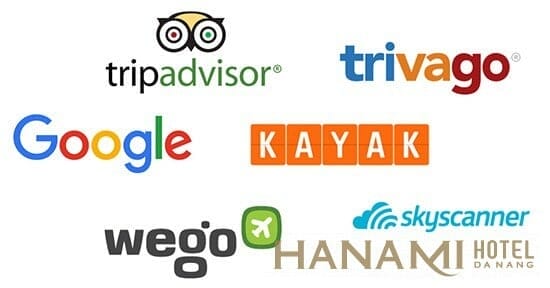In order to maximize hotel revenue and profit, marketing metasearch currently plays a very important role for hotels in obtaining growth and development opportunities. There are numerous reasons why hotels should not ignore such a good opportunity. You can find the answer in the article of Hanami Hotel Danang “Marketing Metasearch – Why hotels should not ignore”. Let’s research together!
Some reasons why hotels should participate in Marketing Metasearch
Extending a wide range of approaches
The global Internet is gradually asserting its position. The Metasearch platform was created as an inevitable rule of the development of the Internet network.
Additionally, Metasearch itself has a large user base and diverse sales channels. Some major platforms such as Trivago, Expedia, Google Hotels, and so on, receive hundreds of millions to billions of views and searches per day from all over the world. The more locations your hotel appears in, the more probable your hotel will reach wider visitors and potentially generate a large revenue stream.
Competing with OTAs
Metasearch is a large platform containing many different OTAs channels such as Booking, Traveloka, Agoda, etc. By appearing on these platforms, your hotel will easily attract attention and become different from OTAs channels. This helps to attract potential and new customers who have the behavior of searching for hotels, and tourist destinations. As a result, this increases online bookings for hotels.
Identifying the right target
If you advertise or update room availability on certain days of the week, so you don’t need to pay anything for guests who click on the link when they visit on closed days. Moreover, this can also happen with different platforms. So the cost is an optimized sum in this case.
Increasing revenue and profit
Some travelers have a preference for the Metasearch platform. Because they find metasearch simple and quick for them to find and access hotels. Thanks to direct access to hotels, they can know the rates to easily compare prices between different places at the same time instead of having to visit multiple pages as before.
For some hotels, implementing a metasearch marketing strategy is very important and essential. Because it supports the hotel reach more potential customers, increase bookings, as well as maximize revenue.

Collecting customer information
Unlike OTAs, when using metasearch platforms, you will be able to access and collect a large amount of customer information passively when they click the booking button. This will allow you to build yourself a large customer information database and be proactive in taking care of customers before and after the sale via email, phone, etc.
Upselling and cross-selling
Once customers are interested in your website, you will have the opportunity to enhance the customer experience through a variety of media. With the proactive advantage, you will have the opportunity to upsell and cross-sell services at the hotel: upgraded rooms, spa services, gym, bar, restaurant, etc.
These things seem insignificant but they can boost revenue at hotels. By raising service fees on small products that can be sold in huge quantities because of their inherent convenience.
Some outstanding metasearch marketing platforms in the Hospitality and Tourism industry
- KAYAK: This is one of the first Metasearch channels, KAYAK debuted in 2004 and was purchased by Booking Holdings in 2013.
- Wego: Formerly known as Bezurk, Wego is a Singapore-based travel search website. The website is available in 76 countries and more than 22 languages. However, it is most popular in the Asia Pacific and MENA (Middle East and North Africa) regions. It is also the top 1 travel app for iOS and Android devices.
- Skyscanner: Founded in 2003 in Edinburgh, Scotland, Skyscanner was acquired by Shanghai-based Trip.com Holdings in 2016. Today, Skyscanner is now used by 100 million people per month in 52 countries and is available in over 30 languages.
- Google Hotels Ads: Google currently accounts for 67% of total metasearch spend, indicating that it is the top priority platform.
- TripAdvisor: Launched in 2000, Tripadvisor is one of the most well-known metasearch platforms. Now, it is one of the most worldwide popular travel websites and also is a primary source of traveler feedback.
- Trivago: Launched in 2005 and purchased by Expedia Group in 2012, Trivago now works with more than 180 OTAs around the world.
Participating in Marketing Metasearch not only helps the hotel promote its image, but also can introduce to international guests the image of the home country. Hopefully, Hanami Hotel’s article has useful information about “Marketing Metasearch – Why hotels should not ignore“. See you in the following post.
Về tác giả:
Chúng tôi không kiếm lợi nhuận từ nội dung đăng tải. Các bài viết đều được biên soạn và kiểm duyệt bởi đội ngũ tác giả và biên tập viên của công ty TNHH du lịch khách sạn Hana. Xem thêm: về tác giả






